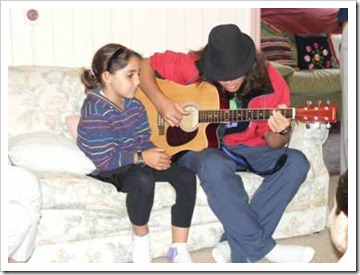
Accepting this commandment requires courage and a self-reflection strategy. Being a role model does not mean taking the blame for everything your kids do, but it does mean recognizing your ability to change what they do by modeling a different behavior yourself.
When I present this to parents, I get responses like “If my child is sick, does it mean I’ve modeled it?” and “My child swears, but he’s never heard it at home!” Being a role model does not mean your kids do something because of you or because they have seen you do it, but it does mean that as s role model, you can do the opposite and demonstrate good alternatives. If your child is sick, it is not your fault, but if you are a role model for eating junk, abusing your body and pay attention to them when they are sick, do not be surprised they have resort to this coping mechanism.
Here are just some of my role-modeling commandments:
- Kids are like mirrors – they look at me and imitate. They do not know any better way. When I do not like what they do, I had better ask myself, “When do I (or any other important person in their life) behave like that?”
- Kids are very sensitive to their parents’ emotions – they can read fear, anger, love, pride and disappointment even when they cannot express it. Parenting is not about what you say but about what you really believe and feel. Do not fake another feeling, because your kids will know the difference. Do your best actually to feel different.
- Teach kids that there is no such a thing as failure, only learning and experience – do it by treating “failures” as opportunities to learn and setting an example. Thomas Edison tried to create a working light bulb 1,500 times before he succeeded. In the end, he said, “I never failed. With every unsuccessful attempt, I learned what does not work”. Thomas Edison never said he was not disappointed. I am sure he would have liked to succeed on the first or second attempt, but trying again and again with slight differences got him eventually to the “right” thing. Research shows that kids have this determination until the age of 5, but with failed experiences that are labeled “wrong”, that determination fades.
- Explain to your kids that growth means stretching ourselves to do things that are uncomfortable and challenging – no growth is done without learning and every learning starts with the ability to let go of the person I am today and the hope of meeting the person I want to be. Stretch yourself. Make a list of things that are hard for you to do and show your kids how you conquer your fears.
- Give your kids the message that knowledge is king – they can learn something new all the time, especially while they are at school. Make sure they understand that learning is a lifestyle, not something you do because you have to. Kids who appreciate school and the learning they get at school get a lot more out of their time at school than those who resent it.

- When kids do not understand, it is always because you have not found a good way to explain – the proof is they did not understand. You are the grownup and it is your responsibility to find a way that is suitable for their age and ability to comprehend. Do not blame them for not understanding. Instead, say, “I have not found an easy explanation (yet)”.
- It is OK for me to say how I feel – it teaches my kids it is OK to express feelings and that Mom and Dad are not almighty, they are only human and sometimes feel stressed, sad or afraid. Of course, this works best when the feelings you express are both positive and negative.
- Share your past with your children – it is a good way to help them get to know you and understand why you think, believe, behave and do the way you do. Be honest and share disappointments and learnings as well as successes and fun. This is your opportunity to pass on your values and culture to the next generation.
- Your kids will be in relationships all their life – the quality of their relationships will determine the quality of their life and even the length of their life. Research proves that people in long-term relationships are happier and live longer. Set an example for good social skills. Work on your relationship with your partner, have friends and invest in your social life. Friendly parents raise friendly kids.
Join me next week for my parenting rules about … manners.
Happy parenting,
Ronit
This post is part of the series Ronit's Parenting Bible:
- Ronit’s Parenting Bible: Who’s in Charge?
- Ronit’s Parenting Bible: Love
- Ronit’s Parenting Bible: Food
- Ronit’s Parenting Bible: Babies
- Ronit’s Parenting Bible: Change
- Ronit’s Parenting Bible: Role Model
- Ronit’s Parenting Bible: Manners
- Ronit’s Parenting Bible: Gender
- Ronit’s Parenting Bible: School
- Ronit’s Parenting Bible: Money












